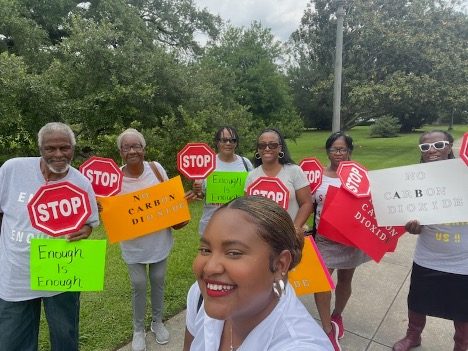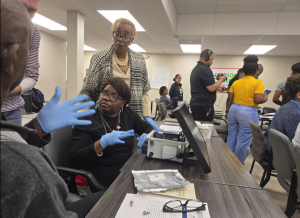
In Baton Rouge, Bayou Environmental Justice Coalition fights for residents living along Louisiana’s notorious “Cancer Alley,” particularly in rural communities like Alsen and St. Irma Lee in East Baton Rouge, where residents face disproportionately high cancer rates from the 85-mile stretch of petrochemical facilities along the Mississippi River. Founded as communities of the formerly enslaved by the Freedmen’s Bureau in the 1870s, these communities boasted a multi-generational legacy of landed Black farmers, until a decision by the Baton Rouge City Council in the 1950s to rezone the area’s agricultural land for industrial use. Residents were soon hemmed in by more than 30 fossil fuel, petrochemical and waste facilities. Inspired by past movements, including Alsen’s role in the landmark McCastle V. Rollins case – which validated the rights of communities of color to organize towards class action suits – residents united to hold leaders accountable and defend the right to clean air, water and land for communities harmed by the petrochemical and fossil fuel industries.

BEJC members join the Community Scientist Initiative in partnership with the DeepSouth Center for Environmental Justice, Environmental Defense Fund, and Colorado State University, March 2025.
Bayou Environmental Justice Coalition was founded in 2022 by Quisha Reed-Jones, whose husband is the descendant of one of Alsen’s founders. Reed-Jones moved to Alsen the year prior to rebuild the home her husband’s great-great-grandfather had built as a slave, only to find that they were downhill from the Ronaldson Field Landfill, a controversial site that was sending dangerous floodwater into her yard and other properties. In response, Reed-Jones began organizing. The all-volunteer organization has been committed to improving the quality of life in Alsen while fighting for buyouts that would allow Alsen families to rent their properties to industrial operations while retaining ownership rights. The organization has helped the community by installing a blood pressure monitor in the town recreation center, and is working with a local college to research the impacts of Ronaldson Field, and connect its operation to companies that violated the community’s trust in the past.